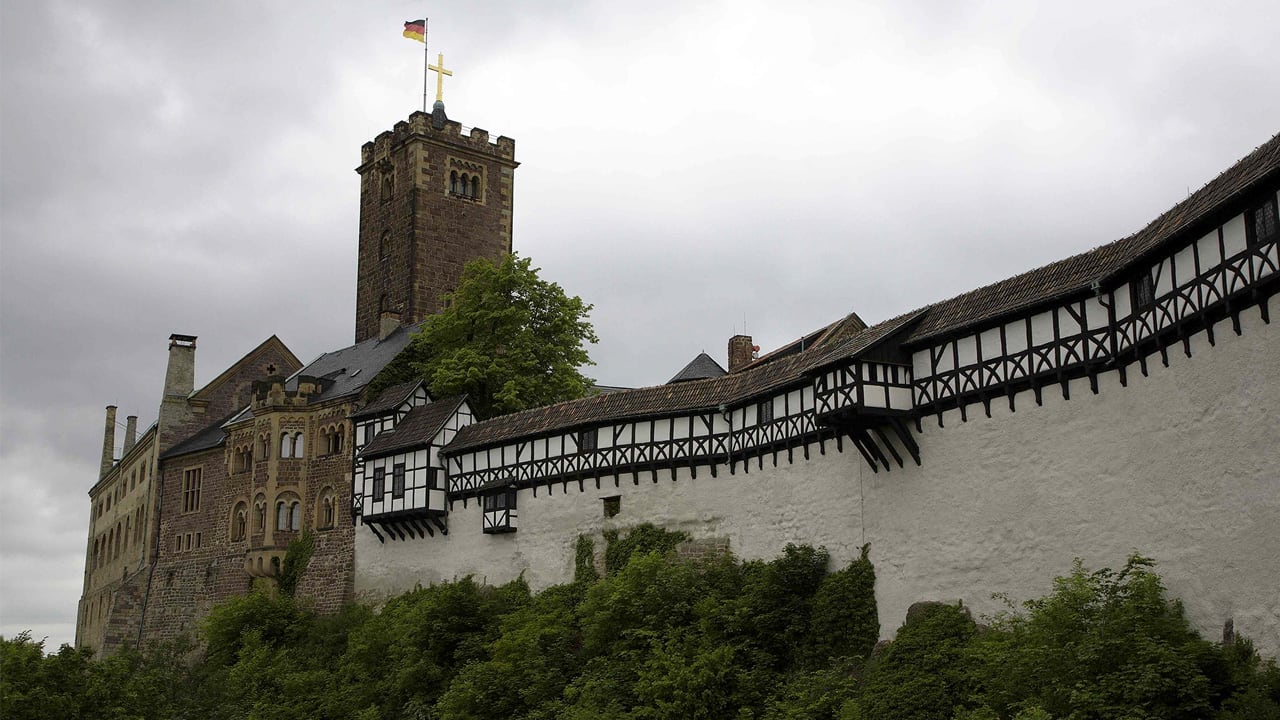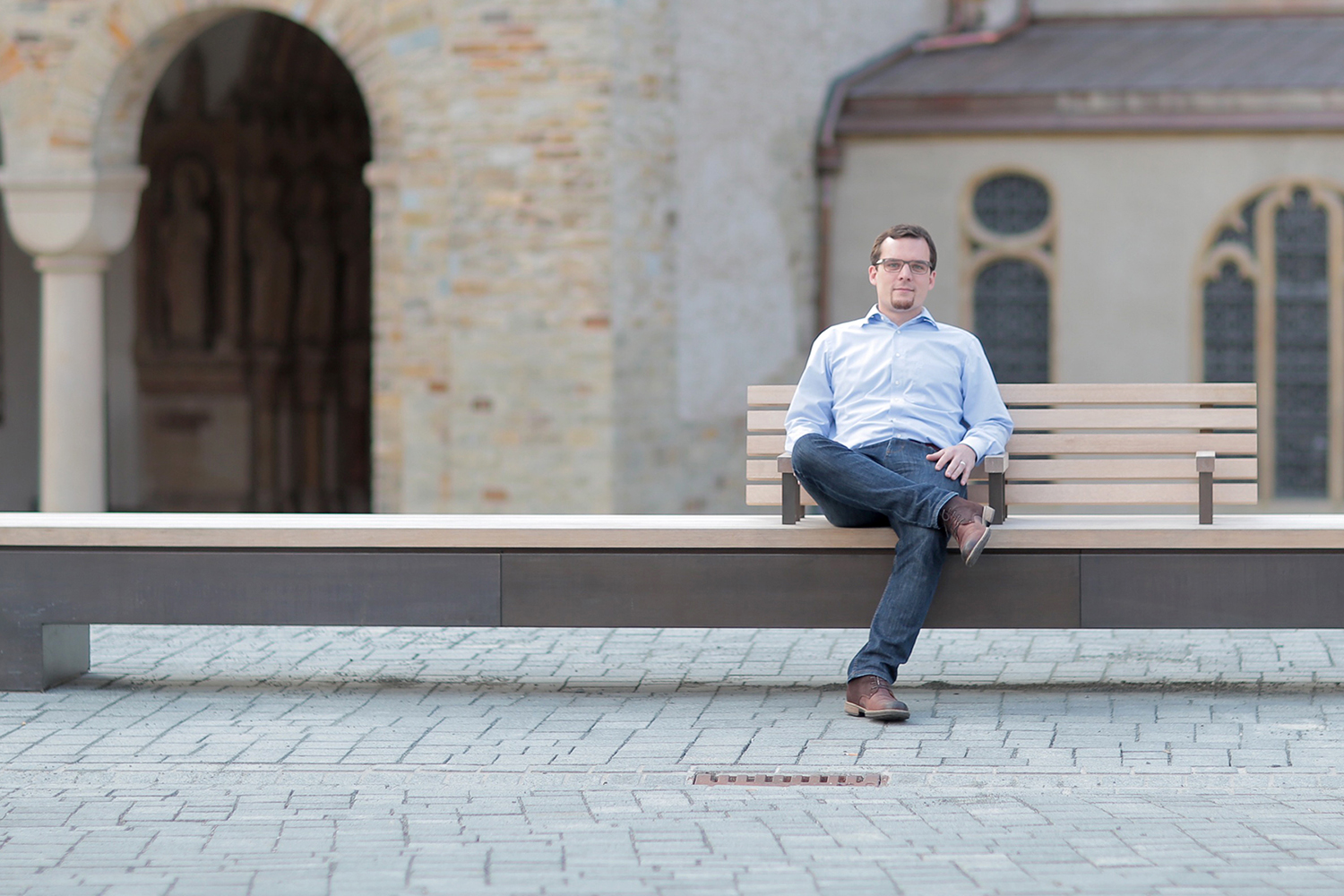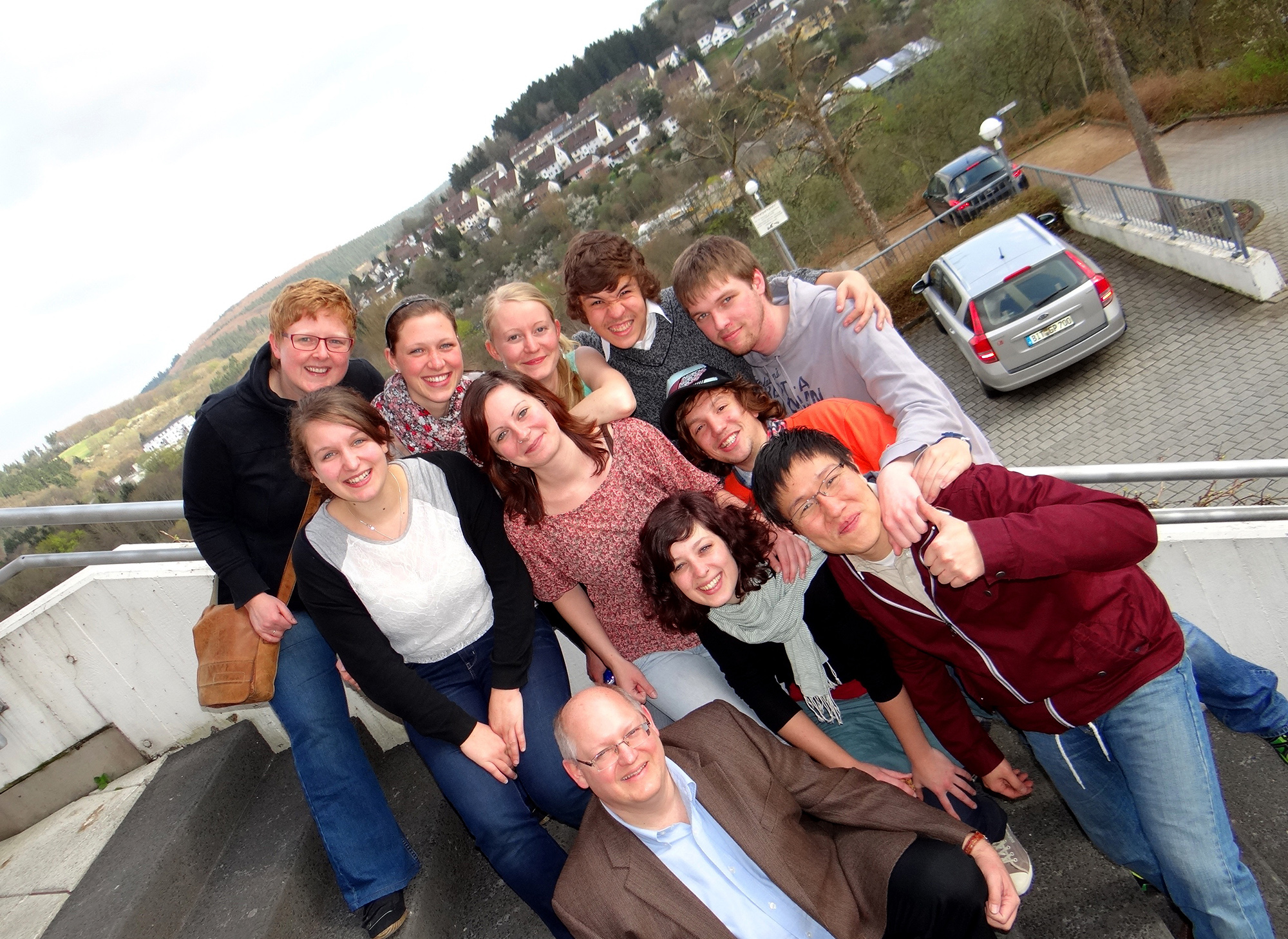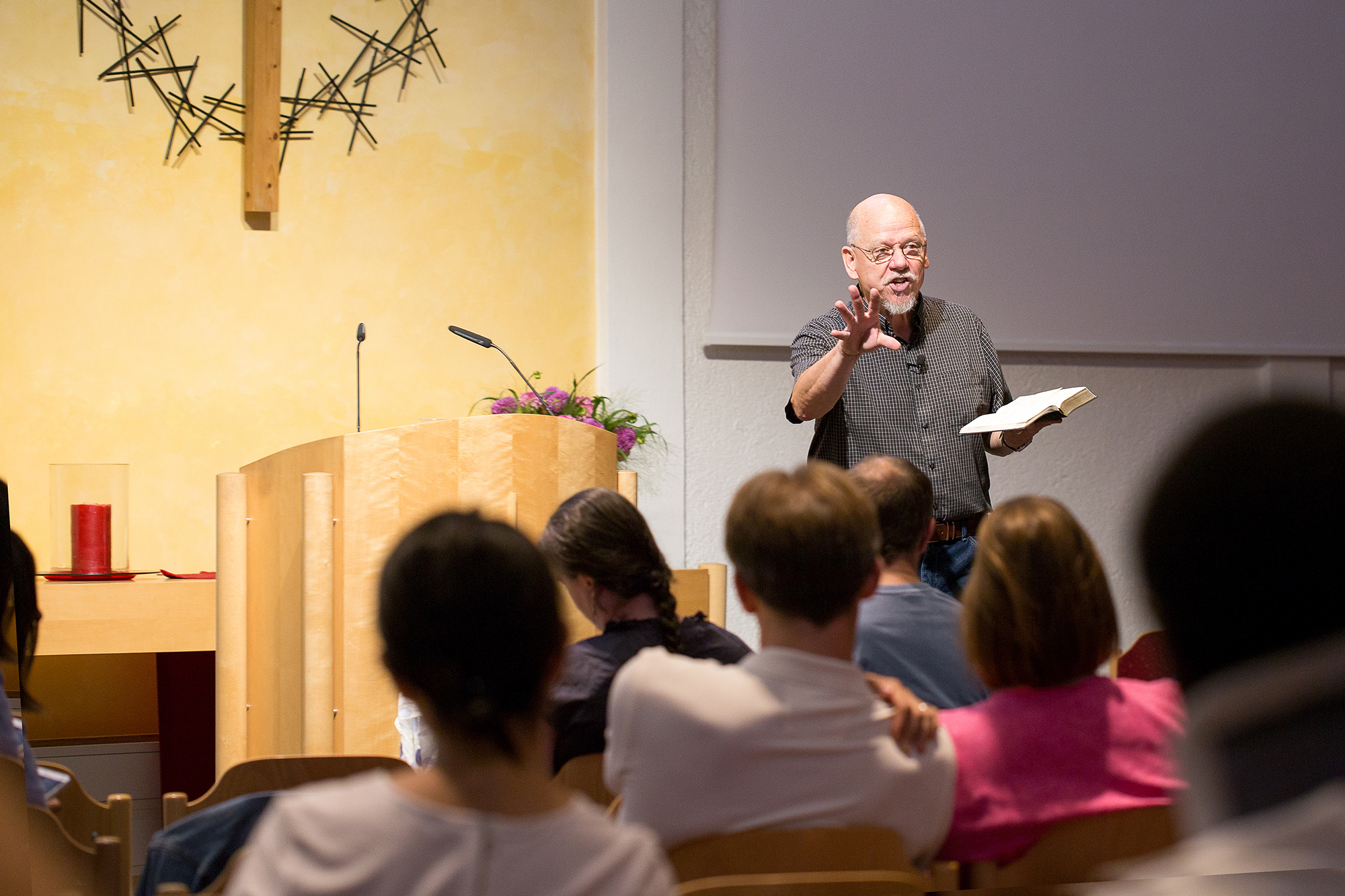Dispatches from the Land of Luther: Alumni Profiles of Jürgen Schulz, Scott Way, and Steve Henderson

If Martin Luther visited Germany today he could buy a pair of Hier stehe ich Converse sneakers, attend a Luther-themed musical oratorio touring the country, or drink a high-malt “Innovator” beer celebrating the 500th anniversary of the Reformation. Would he find a large number of pastors in the Landeskirche—the state Protestant church—preaching the gospel of salvation by grace alone through faith alone in Christ alone? Would he find them teaching Jesus’s literal resurrection from the dead?
Thirty-four DTS graduates currently minister among the free churches and seminaries in Germany. For this article, I interviewed three DTS alums who offer their perspective on the current state of ministry in Germany. They describe the spiritual climate, the challenges of serving and teaching, and the impact of the legacy of Martin Luther.Today, Luther would encounter a state church waning both numerically and in biblical faithfulness. According to a Pew Research Center report in April 2017, there were 1.4 million more Christian deaths than births in Germany between 2010 and 2015. Indeed, forty-two percent of Germans believe in no god at all. Even the Catholic church in Germany declares that the Protestant church is no longer faithful to the Scriptures they claim to teach. In the land of Luther, Germans need a reformation.
Here are their stories.
Jürgen Schulz (ThM, 2011)

“The apathy I’m encountering is the greatest challenge for ministry. It is difficult to interact and invite people to think about faith and life from a Christian perspective.”
Jürgen Schulz, a native German, was raised from childhood to have a love for God and his Word. He studied under DTS graduates in both his undergrad and seminary studies in Germany. When health issues closed the door for him to become a professional musician, Jürgen saw God clearing the way for further seminary studies. He heard that the OT department at DTS had an excellent reputation. At seminary, Jürgen was impressed by Dr. Eugene Merrill’s emphasis on the need for both rigorous study and pious discipleship. Jürgen’s dual ministry of pastoring and teaching owes itself in part to Merrill’s influence.
Today Jürgen pastors a small church that he and his wife, Lydia, planted in Paderborn, Germany, called Paderkirche (Evangelische Freikirche Paderborn). They have four children, and he teaches at the Rhineland School of Theology. He is pursuing his doctorate at the Evangelical Theological Faculty in Leuven, Belgium.
Jürgen confronts both spiritual apathy and mistrust of the institutional church. “The apathy I’m encountering is the greatest challenge for ministry,” he explains. “It is difficult to interact and invite people to think about faith and life from a Christian perspective. People do not look to the church for answers. They are not completely areligious, but they are also not interested in Christendom anymore. For many people it is not necessarily the message of the church they reject, but they are annoyed by the institution. They do not accept a church that assumes the right to provide the moral and spiritual guidance people need. They think no one has the right to judge one’s life and lifestyle.”
The evangelical churches—so-called “free” churches, as distinct from the state church—are trying to counter the rapid slide of German culture toward spiritual apathy and of the German church toward complete theological liberalism. Small evangelical free churches [not to be confused with the term Evangelische, which refers to the Protestant state church, but rather “evangelical” in the sense of gospel-proclaiming] are growing around the country, but financial limitations hamper opportunities and free church pastors daily contend with negative impressions many Germans have of the “church.”
“The official Protestant national church is dying,” Jürgen clarifies. “They ripped out their soul in embracing the liberal theological approaches [of the 19th and early 20th centuries with Schleiermacher, Hegel, Ritschl, and von Harnack]. The so-called ‘great’ theologians of the past paved the way for the church to die. The gospel is hardly preached anymore, the churches are empty, and the sermons are usually more about politics and philosophical ideas than about the gospel and Bible teaching.”
Scott Way (ThM, 2006)

“We need to get students to think through theology in a way that makes their hearts resonate. We need to put to death the head-heart dualism.”
Scott Way grew up in a conservative Christian home in Canton, Ohio. During his teen years, his family packed everything up and moved to Dallas, Texas. It was at that time he felt the Lord working in his life. “I really longed for a good understanding of the faith so I could be confident of its credibility,” he recalls. After watching the Francis Schaeffer film How Should We Then Live? and reading He Is There and He Is Not Silent, Scott realized that he wanted to go into ministry. He attended Bible school in Dallas and then enrolled at DTS in the mid-80s, but left to pursue a clearer call. He spent a year in Belgium to see if Europe might be the mission field for him.
While there, he met and married his wife, Leona, a German. Scott eventually realized that he was more a teacher than a preacher and returned to DTS where he studied under Mark Heinemann (ThM, 1978), who had served in Germany with Greater Europe Mission (GEM). With Mark’s encouragement, Scott chose to do his internship at Theologisches Seminar Rheinland (Rhineland School of Theology) in Wölmersen, Germany. During that week, he nervously asked school leaders if they could imagine him and Leona serving there. One of the leaders said, “We’ve been waiting for you for eleven years!” Today, Scott serves as a lecturer teaching systematic theology and dean of students at Rhineland. He and his wife, and their three children have lived there since 2008.
Scott believes the legacy of Luther is perceived in various ways today. The challenge is to take something that is not completely unknown but that culture describes as irrelevant—historic Christianity based on Luther’s Reformation and Bible—and persuade Germans that it is both relevant and life-giving. “I’d say Christianity is only a forgotten cultural/historical reality for most people,” he adds. “The church plays a role, but it is almost strictly a secular kind of role. Kids attend confirmation instruction and get confirmed, but the vast majority of them don’t believe what they learn. People don’t go to church except to be married or buried.” More and more people are opting out of church membership so they don’t have to pay the 8–9% church tax. Scott sees the primary spiritual trend in Germany as one of apathy and irrelevancy.
Lack of trained pastors also limits growth. Some fifty theological institutions prepare men and women for ministry in free churches in Germany—churches not tied to the Protestant church. Scott presides as dean of students for ninety scholars at TSR, which makes it one of the larger Bible schools in Germany. Many of these students struggle with a very emotional orientation to their faith, ungrounded in strong theology. Since Scott’s thesis at DTS was “The Value of Theology for Sanctification,” he tries hard to integrate both head and heart into his teaching. “We need to get students to think through theology in a way that makes their hearts resonate,” he explains. “We need to put to death the head-heart dualism.”
While many Germans have resisted the resettlement of large numbers of Syrian refugees, Scott has seen the free churches exercise a great deal of compassion and hospitality toward them. “Evangelical churches have publicly said, ‘We need to treat refugees as our neighbor.’” Rhineland School of Theology is one arm of the Neues Leben (New Life) mission in Germany, which also operates a summer camp nearby.
Recently, German authorities asked if the camp would house thirty Syrian refugees. The camp directors agreed, and the refugees stayed four months. Scott taught them German. When he asked one man why he had left Syria, the man pointed to a map on the wall which showed his home village, then he pointed in each cardinal direction and said, “Boom!” The German government later said the camp had been the most successful location in the area and asked them to host ninety more refugees. “We were thrilled,” Scott said. But local villagers—including some believers—opposed the idea. “They said they didn’t want to be known as a ‘refugee village,’” Scott recalls. “They didn’t want their property values to go down.”
Steve Henderson (ThM, 1980)

“The gospel does flourish in Germany, but not as often as you’d like in the state churches. There’s so much religious oriented works righteousness that characterizes the Lutheran church here.”
Steve Henderson grew up in German-influenced Cincinnati, Ohio. After committing his life to Christ as a teen he served with Campus Crusade for Christ (Cru) at Vanderbilt and in local church ministry in Nashville. He later went to DTS where classmate Cleon Rogers (ThM, 1980)—who had lived in Germany—made Steve aware of missions in Europe. Steve served as a pastor in Texas and then in South Carolina where he founded a Christian school. He and his wife, Robin, moved to Germany in 1999 to pastor Munich International Community Church, a highly mobile congregation of some 150 to 200 families. The congregation represents many different cultures and ecclesial backgrounds.
Steve believes that Luther’s use of the printing press and his translation of the Bible were two of Luther’s greatest contributions. “Just as the King James Version Bible profoundly shaped the development and stabilization of the English language, Luther’s translation of the Bible into a vernacular and common/standardized German left deep impressions. Luther’s vocabulary, idioms, figures of speech, and phrases exist in German yet today.”
“Because of Luther,” Steve adds, “the gospel does flourish in Germany, but not as often as you’d like in the state churches. There’s so much religious oriented works righteousness that characterizes the Lutheran church here. Bromides, pleasant smiles, but nothing of transforming hope that comes through electrifying, life-giving grace.”
Most Germans, Steve explains, seem to “be blissfully unaware of their spiritual condition.” Apatheism [I don’t know if there is a God and I don’t care] is rampant. While some Germans seem open to ministry from English-speakers because it is outside of their normal cultural boundaries, many others relegate religious terms and activities as part of their cultural heritage without making the connection to their own need for salvation. They are happy to wear Luther sneakers or drink Reformation-inspired beer, but for them the Reformation is a historical event, having little practical or personal significance.
The irony of religious apathy in the cradle of the Reformation is not lost on some Germans. The headline of a recent article in a Saxon newspaper read: Kirchentag im Land der Gottlosen, “Church Day in the Land of the Godless.” Steve sees the disconnect. Wittenberg—site of Luther’s Ninety-Five Theses and numerous church festival days—has a population of 45,000 but “acknowledges it has few Christians,” Steve explains. “Fewer than most anywhere else in Germany.”
The spiritual climate of the state Protestant church in Germany is not many degrees warmer than the culture around it, Steve said. “Luther would be horrified by theological trends: abandonment of biblical authority, drifting from the solas of the Reformation, blending with the world’s priorities and precepts at almost every level.” Current Lutheran church theologians are faced with a dilemma on the 500th anniversary of the Reformation: how to honor Luther the man, when the state church no longer believes or teaches what he taught.
A Glimmer of Light
Despite the challenges of ministering in Germany, Jürgen, Scott, and Steve each see signs of hope. Surprisingly, a major opportunity for Christians in Germany has arisen because of the influx of immigrants, fugitives, and refugees. Jürgen explains, “Through the massive refugee crisis in the last two years, many Germans started to think about their spiritual roots and became interested in the Christian faith again. Furthermore, the international community in Germany is a lot more open and curious about the Christian faith. The Germans often stay away while the foreigners want to know more.”
A new Reformation is needed in Germany, one led not only by sound theological scholars, but also by Christians willing to welcome the alien and stranger in the name of Christ. It would be a fitting 500th anniversary gift for Germany’s most famous former fugitive—a man once declared a heretic and secreted away to safety in Wartburg Castle—a man by the name of Martin Luther.
About the Contributors


